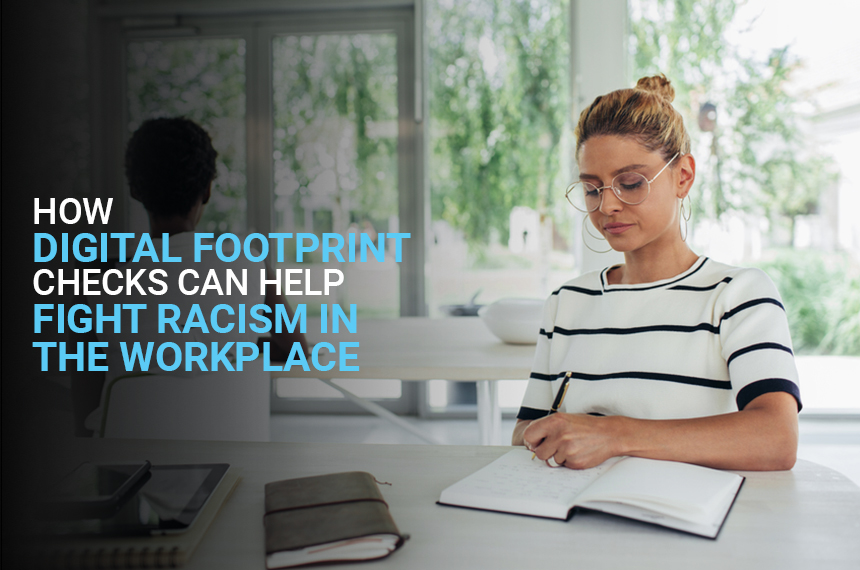How often have you heard someone say something racist or seen somebody engage in racist behaviours at work?
Racism in Australia is a topic that most people walk on eggshells around. We would rather talk about diversity, equity, and inclusion (DEI) rather than call out racism and confront the issues surrounding it head on.
There is a need to strengthen every organisation’s commitment to DEI to make the workplace a better, healthier, and more welcoming space for all employees.
A social media check, also known as digital footprint check, can be an effective tool for obtaining this goal.
Racism in the workplace
Racism is a form of discrimination against people due to their membership of a particular racial or ethnic group, typically one that is marginalised. It is still a devastating reality in workplaces, schools, and even families, despite decades’ worth of efforts to combat it.
Racism in the workplace is systemic and deeply entrenched: in policies, cultures, structures, and personal attitudes. Of course, it negatively impacts the individual employees who go through it throughout their careers; however, it also disrupts workplaces as it hinders innovation, revenue growth, staff morale improvement, and overall productivity.
In some cases, it costs organisations a few of their best employees.
Why is inclusion at work important for Australian organisations?
To be an inclusive organisation means creating an environment where employees are valued and treated with fairness and respect, irrespective of their ethnic background.
Recent concensus reveals that Australian businesses are more willing to commit to a more diverse and inclusive workplace. Employees, on the other hand, also want to support their companies in this commitment — 3 out of 4 have expressed this interest.
From the Diversity Council Australia report:
DCA’s Inclusion@Work Index showed the incredible impact that inclusion can have on people and culture, showing that workers in inclusive teams are:
- 4 times less likely to leave their job in the next 12 months
- 10 times more likely to be very satisfied
- 4 times less likely to feel work has a negative or very negative impact on their mental health.
- 5 times less likely to experience discrimination and/or harassment
- 11 times more likely to be highly effective than those in non-inclusive teams
- 10 times more likely to be innovative
- 6 times more likely to provide excellent customer service
- 4 times more likely to work extra hard
Case study: ACTU dismisses an employee over Facebook posts
Below is an example of an Australian institution doubling down on their DEI commitment:
In February 2022, the Fair Work Commission upheld The Australian Council of Trade Union’s (ACTU) dismissal of an employee who was fired over Facebook posts that contained violent, homophobic, transphobic and racist content.
The deputy president of ACTU stated to the media that their employee’s behaviour on Facebook caused a serious risk to ACTU’s “critical reliance” on its brand and reputation.
The decision to fire the employee came 24 hours after his Facebook account was discovered, which contained:
- Posts praising violence against police at anti-vaccine mandate protests
- Disparaging comments about the Black Lives Matter movement
- Comments that referred to transgender people as demonic
- Posts that mocked domestic violence victims
How digital footprint checks help fight racism at work
A digital footprint check is a combination of powerful artificial intelligence and expert human analysis that highlights any red flags in your candidates’ online activity, whether it’s on social media, forums, the Dark Web, news stories and more.
When integrated into an organisation’s hiring process, a digital footprint check can determine a candidate’s potential risks, cultural fit and alignment with their values. With a digital footprint check, the following will be highlighted:
- Discriminatory behaviours: such as sexism, racism, transphobia and hate speech
- Unprofessional behaviours: such as strong language and online bullying
- Criminal behaviours: such as indications of violence and incitement
A digital footprint check can identify potential racist behaviour even before the candidate enters your workforce.
It also offers all organisations the opportunity to prevent bad hires, protect their reputation and cultivate safe, welcoming workplaces that reflect their values.
Work with CheckSocial
At CheckSocial, we believe that one bad hire to throw off the balance of your organisation’s culture. Why risk having high performing employees at the expense of trust?
Our reports do not provide direct advice on whether a candidate is employable. Rather, they flag any behaviour that indicates potential risks to your organisation’s brand, culture and reputation.
In order to reduce the risk of introducing bias or discrimination into the hiring process, CheckSocial uses a consistent framework to assess each and every individual, in addition to utilising an AI-driven method of data gathering to help ensure fairness and balance.
Download a free sample report
To get an example of what a digital footprint check looks like, the information they include and the types of content they flag, you can download a free sample report.
The 23-page sample includes:
- A Candidate Risk Score and Cultural Fit Assessment
- An outline of our cultural fit indicators
- Examples of content that indicate discriminatory, unprofessional and criminal behaviours
- Examples of other candidate insights
